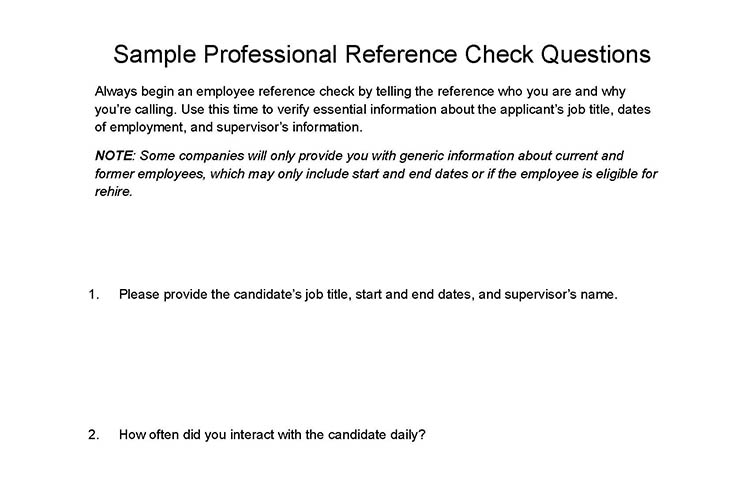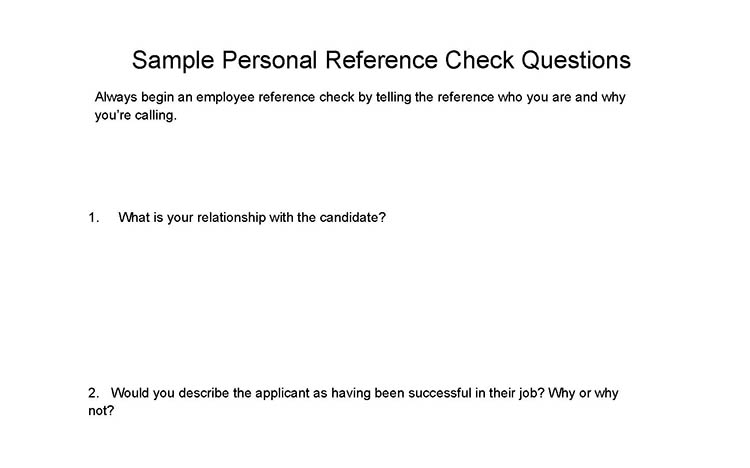Conducting a reference check is a vital part of your hiring process as it helps verify the information a candidate has given you and provides additional details about the candidate’s work performance and abilities. It is equally important to know what reference check questions to ask as this will help you make the best hiring decision.
Let’s dive into some of the best questions to ask when checking references, along with some tips for getting the most out of your time with each reference. We’ve listed our reference questions below for professional references (basic, work ethic, and character questions) and personal references.
Basic Professional Reference Check Questions
Start your professional reference check conversation with a friendly greeting, thank the reference for their time, and tell them anything they say will be kept confidential. You’ll generally start with a “housekeeping” question to get the basic details. Then, follow up with additional questions to ask during a reference check.
Download our customizable professional reference check questions.
1. What was your job title, the candidate’s job title, and how long did you directly supervise the candidate?
This is a great way to verify the reference was a direct supervisor of your chosen candidate. It also helps you determine how much weight to give this reference’s answers. If the reference only supervised your chosen candidate for a few months, they may not provide as full a picture as you’d like. You should keep speaking with them but also understand the limitations of their answers. If you happen to be talking to a personal reference, use your first question to establish the reference’s relationship to the candidate.
2. Why did the candidate leave your company?
Some references balk at this question or provide vague information. What you’re ultimately looking for here is a verification of what the candidate told you about why they left the company. Ask follow-up questions about whether they left on good terms and how much notice they gave. This is good information to have so that you know what to expect if the candidate ever decides to leave your company.
3. Would you rehire the candidate?
Any response other than an immediate yes is a red flag. If there’s hesitation, ask why; and if there’s a caveat, ask why. If the reference hesitates on rehiring this candidate, maybe you should hesitate to hire them.
As part of a strong hiring process, we recommend asking basic questions, work ethic and experience questions, and character trait questions of all professional references.
Professional Work Ethic & Experience Questions
This is the meat of the professional (or employer) reference discussion—where you gather specific information about the candidate’s abilities and what it’s like to manage them. Pay close attention to the answers provided and ask follow-up questions frequently. Use the following questions for a reference check.
4. What kind of work did the candidate do for you?
This will give you an idea of the candidate’s daily duties. Ensure these line up with the duties you need them to do for your organization. Here’s a great opportunity to ask detailed follow-up questions to probe a little deeper into the candidate’s abilities, specific projects the candidate handled, or how much training the supervisor had to provide.
5. How did the candidate handle difficult or complex projects?
Asking this question helps you understand the candidate’s ability to work well under pressure. If the job you’re hiring for requires quick thinking and action, spend time here asking for more details and examples.
6. Can you give me an example of a setback the candidate faced and how they dealt with it?
Especially in challenging situations, workers may become overwhelmed and face setbacks. No one is perfect, and understanding how someone handles tough situations can prepare you to effectively manage an employee. It also gives you insight into the candidate’s ability to pivot and overcome obstacles.
7. What are the candidate’s greatest strengths?
This is a common question—one any reference should be able to answer with confidence. If there’s any hesitation by the reference, that’s a red flag. Ask follow-up questions to ensure you get the full picture of the candidate’s strengths and how they relate to the job you need them to do.
8. What are their most significant weaknesses?
A common follow-up question, this lets you know where you might need to provide support or guidance to the candidate if you hire them. As their manager, you need to know what will make this candidate successful in your company. Many references give responses like the candidate “works too hard” or “cares too much.” If you get those superficial responses, dig deeper.
9. Given the requirements of this job, what training or education would the candidate need in the first few weeks?
If the answers given here aren’t job- or task-focused (like the candidate needs to work on handling anger or stress or managing their work schedule), that may present a case for consideration of whether you truly want to hire this individual.
However, if the responses are more focused on aspects of the job (like the candidate may need more training on your company’s proprietary systems or software), that’s different and generally easy to overcome. Knowing this information can even help you prepare a modified new employee onboarding plan.
10. What do I need to know to effectively manage this candidate?
This is an extremely important question to ask professional (and personal) references as it gives you insight into how to manage the new hire. Every employee may need slightly different management. Some need a more hands-on approach, while others need more independence and hands-off management. Knowing what this candidate needs allows you to set the right tone from day one.
Character Trait Questions
Understanding a candidate’s character is vital. You need to be sure they fit with your company culture and can work well with their colleagues. When speaking with professional references, below are the best questions to ask.
11. Does the candidate work better alone or with a team?
Some people are simply better workers on their own. If the reference notes that the candidate didn’t work well with others or regularly faced interpersonal battles, take note. If the job you’re hiring them for doesn’t require working with others, this may be acceptable. But if you need them to work as part of a team, this could be a deal breaker.
12. Was the candidate a good communicator and listener?
Especially if the candidate will work closely with others, or manage workers, they’ll need to have these soft skills. If the reference can’t provide concrete examples to show the candidate’s good communication and listening skills, take note and possibly reevaluate the candidate.
Check out our applicant screening guide for more strategies on how to filter job candidates.
Personal Reference Check Questions
When conducting a personal reference check (from a friend or family member of the candidate, and not a former supervisor), your questions will be a bit different. First, begin by noting the relationship between the reference and the candidate. Then, use the following questions to ask references.
Download our customizable personal reference check questions.
13. Would you describe the applicant as having been successful in their job? Why or why not?
Although a personal reference may not have ever worked with the applicant, they have likely learned something about the candidate’s current or previous jobs. They may know whether the candidate was happy at their former employment and if they felt their career was a success. This could give you insight into why the candidate may be looking for a new job.
14. How does the candidate handle stress and conflict?
The candidate’s personal reference may be able to touch on how the candidate handles stress and conflict in not just their professional life but also in their personal life. Does the candidate lash out? Are they calm, and do they work through issues? This can help you understand how the candidate will get along with managers and team members when at work.
15. What can you tell me about the applicant’s personality?
A family member or friend will know a lot more about a candidate’s personality than a professional reference. This may be because an employee may act differently at work than they do in their personal life. While the reference will likely only give you good personality traits about the candidate, the answer indicates where the candidate excels when it comes to working with others.
Visit our guide on how to conduct reference checks to learn more.
Reference Check Question Tips
Compliance Note: Reference checks differ from background checks. A background check will provide you with detailed information about criminal or financial matters relating to a new hire. Stay away from those types of questions during a reference check, as some of them could even be illegal. Some of our recommended background check providers, however, do also offer reference check features.
Bottom Line
Doing reference checks requires asking the right reference check questions. While you should have a standard list of questions to ask when checking references, you’ll want to actively listen to the responses so you can ask follow-up questions and get as much useful information as possible. Done well, your reference checks can give you a great head start on managing your new employee.

